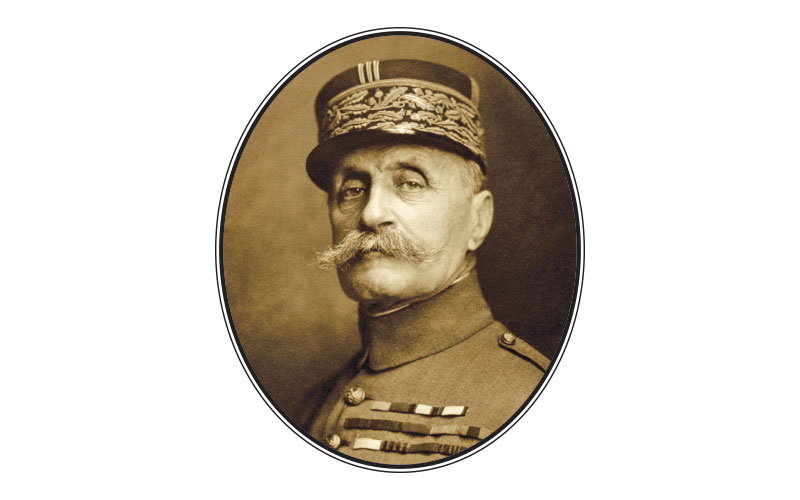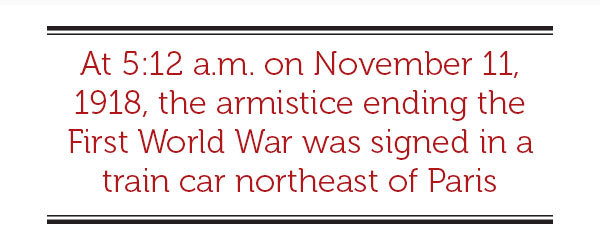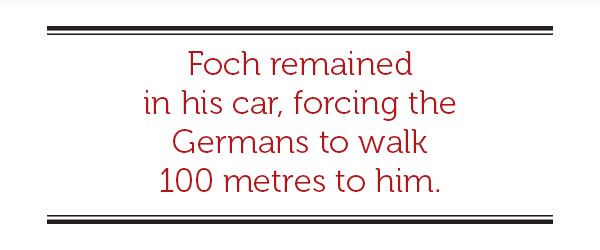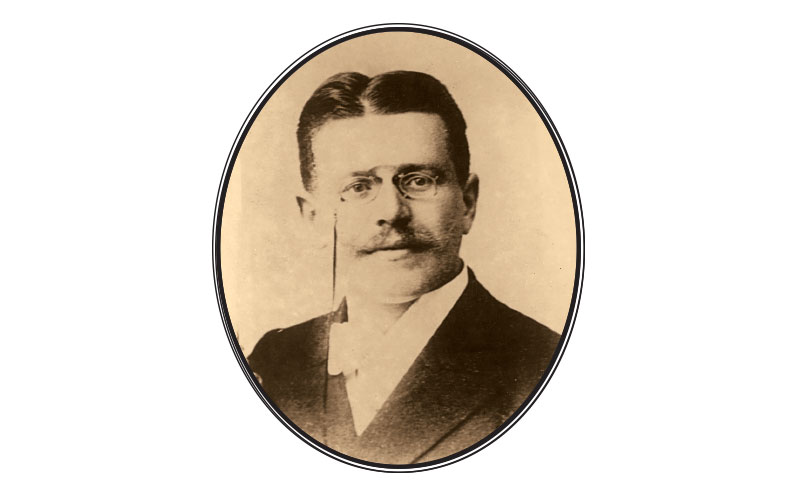
“I have no proposals to make.” — Marshal Ferdinand

MARSHAL FERDINAND FOCH
In the chill dawn of Nov. 8, 1918, Commander-in-Chief of Allied Forces Marshal Ferdinand Foch waited in rail carriage #2419 for the arrival of a German delegation. Having been given command of all Allied forces on March 26, Foch had fought the German army to the brink of collapse in less than eight months. Now, on a remote railway siding in Forêt de Compiègne near Rethondes, France, he sought to end history’s most destructive war.
Foch had chosen the meeting site—a siding built to accommodate a giant French railway gun—to prevent word of a possible armistice leaking out until he was ready to have it officially announced.
Soon a second train halted on a parallel siding and a six-man German delegation led by Matthias Erzberger descended. Foch remained in his car, forcing the Germans to walk 100 metres to him. As the Germans gathered before Foch, he told his interpreter, “Ask these gentlemen what they want.”
German foreign ministry representative Count Alfred von Oberndorff said they were there to hear the Allied armistice proposals.
“I have no proposals to make,” Foch replied flatly. He then outlined Allied terms for a German surrender.

There were 34 clauses that imposed a crippling and punitive defeat on Germany. Fighting was to cease, Germany’s Rhine River would be occupied within four weeks, all German-occupied territory was to be evacuated, all monies and gold bullion taken from occupied countries returned, most military equipment—including battleships and submarines—confiscated, and Britain’s naval blockade of Germany would continue indefinitely.
The severity of the terms stunned the Germans. Erzberger and his colleagues had hoped to negotiate some leniency, but Foch made it clear nothing was up for discussion. The Germans had been summoned to learn their nation’s fate. And until they accepted the Allied terms, the slaughter would continue.
When one German delegate began to weep, Foch snapped: “I would remind you that this is a military armistice…and that it is directed at preventing your nation continuing the war.” He gave the Germans three days to answer. Lacking any recourse, they accepted the armistice, with fighting to cease at 11 a.m. on Nov. 11.
During the ensuing Paris Peace Conference (also known as the Versailles Peace Conference) in 1919, Foch opposed any leniency for Germany. He particularly sought permanent occupation of the Rhine to secure France from German aggression.
“This is not peace. It is an armistice for 20 years,” he said. Foch died on March 20, 1929, without knowing his prediction would come true.

“A nation of 70 million can suffer, but it cannot die.” — Matthias Erzberger
MATTHIAS ERZBERGER
Born on Sept. 20, 1875, Matthias Erzberger was first elected to Germany’s parliament, the Reichstag, in 1903. A member of the Catholic-dominated Zentrumspartei (Centre Party), Erzberger soon led its left-wing faction.
Erzberger initially supported the war and German annexations of extensive captured territory. As the war dragged on, however, his support for it waned. He joined other moderates—including Prince Maximilian of Baden—in attempting to stop resumption of unrestricted submarine warfare. Renewal of such submarine operations on Jan. 9, 1917, led directly to the United States siding with the Allies four months later. Convinced America’s entry into the war meant certain defeat, Erzberger was a chief author of the July 19, 1917, resolution seeking a negotiated peace with no territorial gains.
By October 1918, Germany’s defeat seemed inevitable and Kaiser Wilhelm II, Germany’s last emperor, appointed von Baden as chancellor in hope that his reputation as a moderate and opposition to the submarine warfare policy would yield favourable peace terms. Von Baden chose Erzberger to lead Germany’s delegation at the armistice talks at Rethondes.

Nobody on the German side envisioned that Marshal Ferdinand Foch was empowered only to dictate terms already agreed by the Allied powers. He wasn’t there to negotiate. When Erzberger reported the Allied surrender terms to Berlin, Field Marshal Paul von Hindenburg personally telegraphed instructions that he was to sign the armistice even if no modifications were possible. Von Baden had resigned on Nov. 9, and his successor as chancellor—Social Democratic Party leader Friedrich Ebert—also authorized Erzberger to sign the armistice.
In a short speech, Erzberger decried the harshness of the terms and declared that “a nation of 70 million can suffer, but it cannot die.” He then signed the armistice agreement and offered his hand to Foch, who ignored the gesture and simply said, “Très bien.”
Erzberger, as minister of finance and vice chancellor in Germany’s first republican government, strongly advocated acceptance of the Treaty of Versailles. With right-wing nationalists increasingly promoting the idea that Germany’s military had been “stabbed in the back” by civilian politicians, Erzberger was singled out as a chief perpetrator.
“There is…only one salvation for the German people. The country must be filled everywhere with the irresistible cry: ‘Away with Erzberger!’” ranted one critic. Such incitement led to his forced resignation in March 1920. Then, while vacationing in the Black Forest on Aug. 26, 1921, he was assassinated by two members of a right-wing death squad.
Advertisement






















